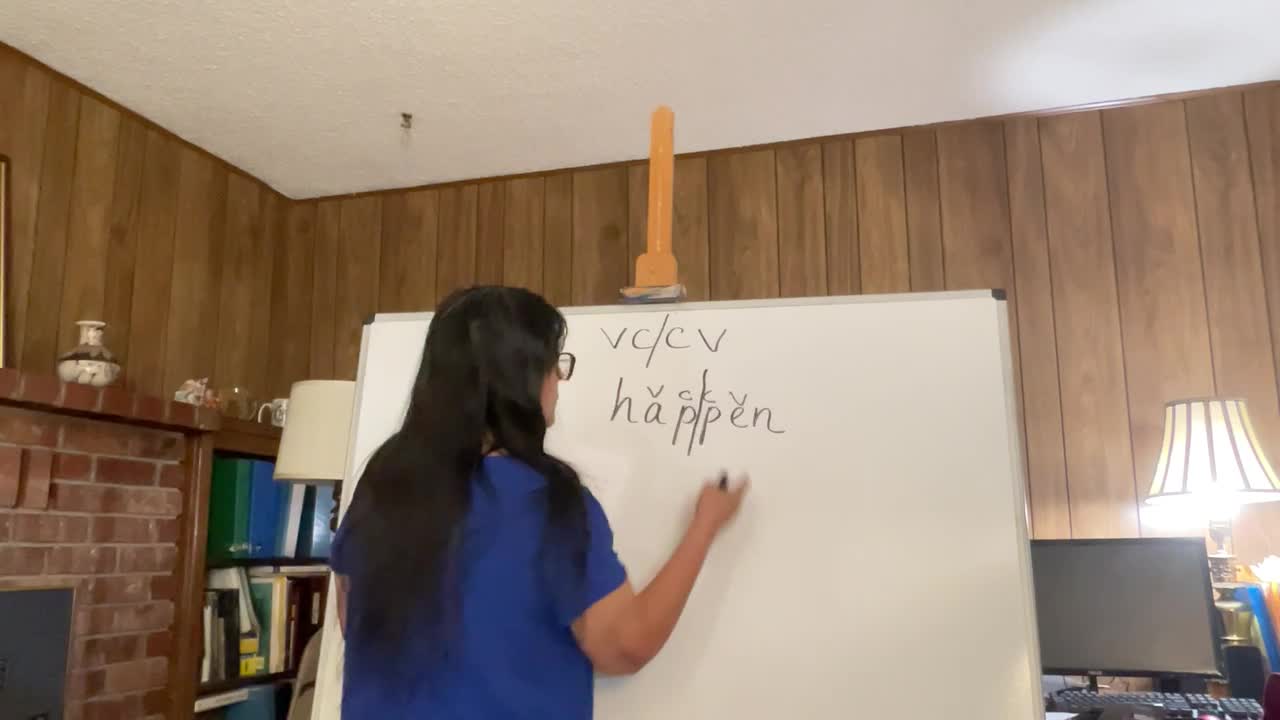Premium Only Content

Lesson 17 - Syllabication Rules
SPELLING/SYLLIBICATION RULES
When teaching the student how to read, it is important for them to keep their own notebook with all the phonemes and spelling and syllabication rules that they learn. The teacher/parent should carefully go through each phoneme one at a time saying the sound or sounds first and then having the student repeat the sound/s and write them neatly in their book, in a manner as presented in this book. Where it is difficult for them to understand the written letter, use clay to form the letters or have the student follow the shape of a magnetic letter with their finger then have them say the sound before attempting to write it. Once the phoneme is introduced, it should be drilled every day. All the phonetics sounds should be introduced in kindergarten, and then repeated through the fourth to fifth grade adding spelling and syllabication rules. Some methods do not have students use key words to learn their phonemes. I personally have used both methods and have mixed them. Each student is unique and I would therefore recommend that the teacher/parents discern the method or methods which work best for the student. It is very important for the teacher to try to pronounce single consonant letters as pure as possible. This will help to not cause any confusion to the student. For example do not add ‘ŭ’ to the end of consonants as in ‘bŭ’. It is better to say ‘bĭ’. Using the short letter ‘i’ sound has been found to be the best in preventing misspellings such as spelling boy - buoy. The following are some of the references I have used to help me with my booklet and method of teaching. The Blue book Method by Kathleen M. Dwyer,M.ED The ABC’s and All Their Tricks by Margaret M.Bishop Solving Language Difficulties by Amey Steere, Caroline Z. Peck and Linda Kahn Writing Road to Reading by Ramalda Spaulding A Measuring Scale for Ability In Spelling by Leonard Porter Ayers There are many more, but these are the ones I like the best.
Kinds of Syllables
1. Consonant ‘le’ is always a separate syllable. It sounds like (ull) in full. The ‘e’ is silent: table, uncle
2.r-combination Makes vowels say a different sound – not long or short: courageous, thirsty, worms, hurry, under, earth, color, car, for
3.Closed (vc) Ends with a consonant, has one vowel which is usually short: cat, bend, fin, lot. Sometimes long: find, cold
4.Open (cv) Ends in one vowel- vowel is usually long: ba by, be, spi der, po ny, mu sic
5.Silent ‘e’ (vce) ‘e’ on the end is silent. Usually makes the first vowel long: sāfe, thēse, pīne, hōme, mūle
6.Diphthong (vv) two vowels equal one sound. The first vowel is often long. ‘y’ and ‘w’ form diphthongs in: awful, few, owl, snow, day, they, valley, boy
Syllabication/ Division Rules
I. A one syllable word must never be divided. Examples: cross, heart
2. Divide a compound word between the words that make the Compound.
Examples: rain/bow, flash/light, foot/ball
3.Vowel consonant/consonant vowel
vc/cv
Description: When two or more consonants stand between two vowels, divide between the consonants, unless they are consonant blends or diphthongs. Example: hap/pen, hun/dred
4.Vowel consonant/vowel
v/cv
Description: When a single consonant comes between two vowels, the most common division is before the consonant, making the vowel in the first syllable long. Example: spi/der, mu/sic
5.Vowel consonant/vowel
vc/v
Description: When a single consonant comes between two vowels it is usually divided after the consonant if the vowel is short.
Example: cab/in, grav/el*-+
6.Consonant/le/
Count back three letters from the end of the word and divide the C/le syllable. Example: hus/tle, cra/dle, un/cle
7.Vowel/vowel
v/v
When they are sounded separately in a word divide between the vowels. Example: po/em, bi/as
8.Remember that a prefix (pre means before) is a syllable that is added to the beginning of a root word to form a new word. Divide between the prefix and the root.
Example: unpack, dislike, return
9. Divide a word with a suffix (an addition added to the end of a word to form a new word) between the root word and the suffix.
Example: want/ed, go/ing, kind/ness
-
 LIVE
LIVE
LFA TV
19 hours agoLIVE & BREAKING NEWS! | THURSDAY 11/13/25
1,403 watching -
 LIVE
LIVE
freecastle
6 hours agoTAKE UP YOUR CROSS- Commit your way to the Lord; trust in him, and he will act!
77 watching -
 30:28
30:28
The White House
6 hours agoPresident Trump and the First Lady Participate in an Executive Order Signing
20.9K20 -
 1:13:56
1:13:56
DeVory Darkins
4 hours agoNewsom SUFFERS MAJOR SETBACK after Trump revokes 17,000 Commercial Drivers Licenses
145K61 -
 1:07:32
1:07:32
Timcast
5 hours agoDemocrats CAUGHT Framing Trump On Epstein, Leaked Emails Show Journalist COLLUSION :+1: 1
175K197 -
 LIVE
LIVE
The Bold Lib
3 hours agoBOLDCHAT: Moms For Liberty | Free Speech w/ANGELA BELCAMINO
52 watching -
 2:11:09
2:11:09
Steven Crowder
7 hours ago🔴 Just Release the Damn Epstein Files - End It Once and For All
527K427 -
 10:06
10:06
VSOGunChannel
4 hours ago $2.29 earnedCongress Tells ATF to Stop Doing the National Firearms Act
18K2 -
 30:40
30:40
The Boomer Effect
19 hours agoNo More Beardos
13K3 -
 1:08:00
1:08:00
Sean Unpaved
5 hours agoMike Vrabel Has Restored The Patriot Way! | UNPAVED
30.1K4